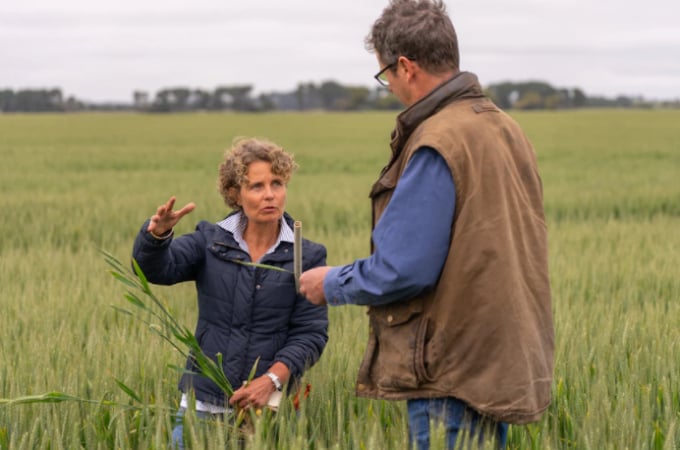November 26, 2025 | 10:48 GMT +7
November 26, 2025 | 10:48 GMT +7
Hotline: 0913.378.918
November 26, 2025 | 10:48 GMT +7
Hotline: 0913.378.918

Jen Lillecrapp works with innovative growers to boost yields. Photo: Landline: Kerry Staight
Rendelsham grower Brett Gilbertson said yield had increased dramatically over recent years.
"It's why we farm. It's why we get out of bed in the morning to see that yield monitor go up," Mr Gilbertson said.
"We're getting 11.7 tonnes to the hectare wheat yields and averaging well above tens across the whole place."
Even in a fertile region like this, consistently reaching double digits would have been scoffed at not so long ago.
"We really never thought we were getting there," Jen Lillecrapp, who works with innovative grower groups, said.
"Even if you go back five years we were probably growing six and sevens and we thought that was pretty good.
"Whereas now, I think if we're not getting eight to 10 we'd be pretty disappointed, so you know it has been a phenomenal jump in yields."
The research project
In the middle of Mr Gilbertson's property is one of the reasons for the big jump: the hyper-yielding crops project.
Funded by the Grains Research and Development Corporation, the research site is dedicated to maximising the potential of high rainfall regions.
It's one of five similar sites set up across the country.
"We've got a thousand plots of wheat and barley dedicated to trying to find the most productive, cheapest, most sustainable-to-grow variety in the region," project leader Nick Poole said.
One of the priorities is to find varieties that suit colder, wetter climates.
In a country where the majority of grain is grown in low to medium rainfall zones, Mr Gilbertson says the project spearheads growing areas that traditionally would miss out.
"We really felt left out, us high rainfall blokes," Mr Gilbertson said.
"The breeding was going down that short, quick-growing varieties [path] that suited the dryland areas and we wanted these long-season winter types."
Researchers have largely turned to Europe for the answers.
"We've looked at regions from northern Germany, UK, right the way through into southern Mediterranean countries," Mr Poole said.
"Where we find at the moment the sweet spot to be in a lot of the material that we've looked at is more French material that seems to be suited to our latitude."
This year for the first time, a French barley topped 10 tonnes a hectare in the trials and wheat yields tipped over 12 tonnes a hectare.
While some of the big performers haven't been commercialised yet, farmers are seeing encouraging results with the ones that have.
"Having access to those varieties is certainly one of the reasons that we're able to push the boundaries," grower Tom Bell said.
"The gain we're getting out of the wheat yields certainly far outweigh the costs."
Reducing costs
Keeping costs down is one of the priorities of the hyper-yielding crop project.
So one of the big questions, especially with fertiliser prices soaring, is how much nitrogen does it take to produce a blockbuster crop?
"They do take large amounts of nitrogen out of the soil," Mr Poole said.
"But rather than it being huge quantities of fertiliser, what we're finding is that hyper-yielding crops are all about a fertile farming system."
Mr Gilbertson is using legumes in his rotation to help achieve that.
"We aren't putting in a lot more nitrogen than when we were growing six and seven-tonne crops, so nitrogen isn't the key to our success."
"Fertiliser timing is probably as critical, if not more critical than the amount we're putting on at the end of the day."
Fertiliser isn't the only cost that comes with growing big crops.
Disease-resistant, stronger crops
Most farmers spray growth regulators on the plants to keep them shorter and stronger so they can handle the load.
They also rely on several applications of fungicide a year to get the grain over the line.
"In our region, disease is a large part of what we're up against," Mr Poole said.
"What we're really wanting [in new varieties] is high yields, good disease resistance, but also really good standing power."
He says there are several exciting options, now coming through the trial sites, that tick these boxes.
"I think everybody is waiting and I think that as soon as they are commercially available, growers will adopt those varieties very quickly," Ms Lillecrapp said.
"Now that 10 tonnes is achievable, they're now saying well what's next, how much higher can we go?"
(ABC News)

(VAN) Brazil's COP30 presidency pushed through a compromise climate deal on Saturday that would boost finance for poor nations coping with global warming but that omitted any mention of the fossil fuels driving it.

(VAN) Poultry farmers in the UK have been warned that they could face one of the worst winters yet for bird flu.

(VAN) Prices of main-crop paddy have risen sharply, with jasmine rice hitting 16,100 baht per tonne — the highest level in years.

(VAN) In Brazil, FAO unveiled a series of reports and initiatives showing how sustainable agrifood systems are a solution to the climate crisis.

(VAN) With names like neodymium and dysprosium, rare-earth elements sound exotic — and their perceived scarcity has only added to the mystique.

(VAN) In a new study published in Trends in Biotechnology, researchers used a gene-editing technology called CRISPR to increase a fungus's production efficiency and cut its production-related environmental impact by as much as 61%- all without adding any foreign DNA.

(VAN) A top official in Beijing’s Cop delegation says China is committed to clean energy – but US’s absence is a problem.